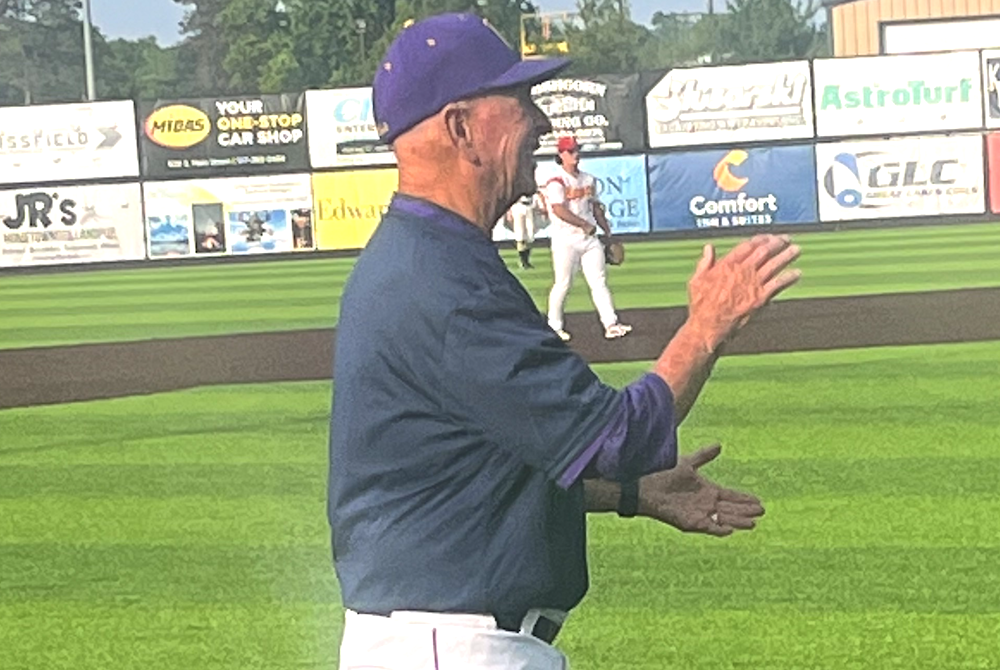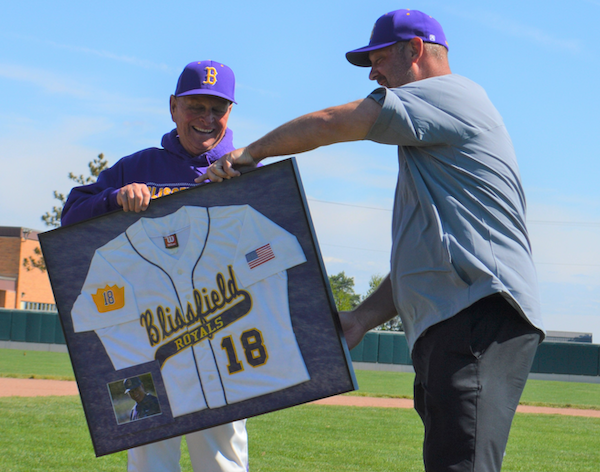
High School a Time for Plays of All Kinds
April 2, 2015
By Jack Roberts
MHSAA executive director
At end of season or school year banquets attended by student-athletes and their parents, I often tell this short story about my mother that never fails to get a good laugh, especially from mothers:
“At the end of my junior year of high school I attended the graduation ceremony for the senior class on a hot and humid early June evening in our stuffy high school gymnasium. The bleachers on each side were filled to capacity, as were several hundred folding chairs placed on the gymnasium floor.
“The public address system, which was wonderful for announcing at basketball games or wrestling meets, was awful for graduation speeches. Person after person spoke, and the huge audience wondered what they had to say.
“I was present because I was the junior class president; and as part of the ceremony, the senior class president handed me a small shovel. It had something to do with accepting responsibility or carrying on tradition.
“In any event, the senior class president spoke briefly; and then it was my turn. I stepped to the podium, pushed the microphone to the side, and spoke in a voice that was heard and understood in every corner of the gymnasium.
“Whereupon my mother, sitting in one of the folding chairs, positioned right in front of my basketball coach – who had benched me for staying out too late on the night before a game, because I had to attend a required school play rehearsal – my mother turned around, pointed her finger at the coach and said, ‘See there? That’s what he learned at play practice!’
“And she was heard in every corner of the gymnasium too.
“But my mother knew – she just knew – that for me, play practice was as important as basketball practice. And she was absolutely correct.”
This old but true story about in-season demands of school sports actually raises two of the key issues of the debate about out-of-season coaching rules.
One is that we are not talking only about sports. School policies should not only protect and promote opportunities for students to participate in more than one sport; they should also allow for opportunities for students to participate in the non-athletic activities that comprehensive, full-service schools provide.
This is because surveys consistently link student achievement in school as well as success in later life with participation in both the athletic and non-athletic activities of schools. Proper policies permit students time to study, time to practice and play sports and time to be engaged in other school activities that provide opportunities to learn and grow as human beings.
A second issue the story presents is that parents have opinions about what is best for their children. In fact, they feel even more entitled to express those opinions today than my mother did almost 50 years ago. In fact, today, parents believe they are uniquely entitled to make the decisions that affect their children. And often they take the attitude that everyone else should butt out of their business!
The MHSAA knows from direct experience that while school administrators want tighter controls on what coaches and students do out of season, and that most student-athletes and coaches will at least tolerate the imposed limits, parents will be highly and emotionally critical of rules that interfere with how they raise their children.
No matter the cost in time or money to join elite teams, take private lessons, travel to far-away practices and further-away tournaments, no matter how unlikely any of this provides the college athletic scholarship return on investment that parents foolishly pursue, those parents believe they have every right to raise their own children their own way and that it’s not the MHSAA’s business to interfere.
It is for this very reason that MHSAA rules have little to say about what students can and can’t do out of season. Instead, the rules advise member schools and their employees what schools themselves have agreed should be the limits. The rules do this to promote competitive balance. They do this in order to avoid never-ending escalating expense of time and money to keep up on the competitive playing field, court, pool, etc.
Every example we have of organized competitive sports is that, in the absence of limits, some people push the boundaries as far as they can for their advantage, which forces other people to go beyond what they believe is right in order to keep up.
If, during the discussions on out-of-season rules, someone suggests that certain policies be eliminated, thinking people will pause to ask what life would be like without those rules.
Our outcome cannot be mere elimination of regulation, which invites chaos; the objective must be shaping a different future.
A good start would be simpler, more understandable and enforceable rules. A bad ending would be if it forces more student-athletes and school coaches to focus on a single sport year-round.

Baseball Remains Front of Tuttle's Mind, Close to Retired Coach's Heart
By
Doug Donnelly
Special for MHSAA.com
June 29, 2023
BLISSFIELD – Larry Tuttle jogged out of Tuttle Dugout onto the artificial turf at Adrian College and took his spot in the third base coach’s box, looked in at the batter as he approached the plate and clapped his hands.
It’s like he never left.
For more than 50 years, Tuttle occupied the third base coach’s box for the Blissfield Royals. He is the winningest high school baseball coach in Michigan history and one of the winningest prep baseball coaches in America. It’s been two years since Tuttle last coached the Royals, but when the Lenawee County All-Star Game came around this year, and Onsted coach Matthew Randall was named a head coach of one of the teams, one of his first calls was to Tuttle.
“To see him coach third base again for two innings of that all-star game was nothing short of amazing,” Randall said. “I love that man and everything he has taught me.”
Tuttle and Randall faced off about 40 times over the years.
“There’s a lot of respect between us,” Tuttle said. “I was happy to do it.”
Tuttle, 79, is a Morenci native who played baseball and graduated from Adrian College, coached for one year at Temperance Bedford and five decades at Blissfield. He spends a little more than half of the year in Florida these days in a house he owns in The Villages, a retirement community about an hour north of Orlando.
This past spring, Blissfield took a spring baseball trip to Florida and Tuttle was able to come out to the field and watch a few practices.
“That’s the best time,” he said. “I always enjoyed those first practices of each season. People will ask me, ‘But what about the cold? It’s always so cold in Michigan that first week.’ The first 10 days or two weeks or so inside, that’s where we formed our whole season, working on the fundaments and the strategy, getting the kids mentally ready for the season. That was a fun part of coaching.”
He returns home to Michigan each summer to spend time with his kids and grandchildren, including a freshman-aged granddaughter who is showing good things in softball. His roots are in southeast Michigan, and he has every intention of keeping it that way.
 Tuttle’s career at Blissfield was nothing short of remarkable.
Tuttle’s career at Blissfield was nothing short of remarkable.
He coached Blissfield for 54 seasons. It would have been 55, but the 2020 season was canceled due to COVID. The Royals won 1,332 games during his career. They won 33 District titles, 23 Regional championships and seven Finals crowns. Blissfield also won 40 league titles, including in his final season of 2021. His No. 18 jersey was retired by the school district.
In 2015, Tuttle was an easy inaugural choice for the Michigan Baseball Hall of Fame.
This summer, Tuttle returned to Michigan in time to see Blissfield play a few regular-season games and was there when his beloved Royals played in the Division 3 District tournament. He wore his familiar Royals gear. When the Lenawee County All-Star game was played, Tuttle was in his full Blissfield uniform. It still fits perfectly.
“I still enjoy the game,” Tuttle said. “It’s my energy level that just isn’t what it used to be. That’s why I stepped down. I still love the strategy of the game.”
When he’s watching a game, he still goes through every play in his mind and what he would do if he was calling the shots.
“You’re always coaching even though you might a spectator,” he said. “It may not be the right way, but it’s my way. That’s baseball. I love thinking about what to do on this count or that count, to take a pitch or not.
“I see a lot of coaches these days who had played in college. Young coaches coach the college way, but you are dealing with high school kids who may not have a real firm understanding of the game itself. You have to teach high school baseball to college kids. You don’t teach college or pro ball to high school kids.”
Tuttle, who has battled some health issues the last couple of years, misses being in his role as coach.
“I miss the players and the relationships I had with umpires and the other coaches,” he said. “It’s hard to replace that.”
Tuttle is an icon in Lenawee County. When he goes to a game, people gather around him to talk. He still follows the area teams and has a relationship with several coaches and ex-players.
Tuttle enjoyed monumental success at Blissfield. The Royals’ last sub-.500 season was in 1971.
“I know that because I have the records,” Tuttle said. “The closest we came was we were 8-8 one year in the 1980s.”
Tuttle has been a stickler for stats his entire career. Some coaches have a hard time remembering how their team did two years ago. Tuttle knows. He kept intricate stats on every team he’s coached at Blissfield and to this day has them organized only a few steps away from his kitchen table at his home in Blissfield – which is just across the street from the high school and a long home run away from the baseball field that is named in his honor.
“I have a file cabinet full of files from each season and I have the scorebook from every year I coached at Blissfield, starting in 1968,” Tuttle said. “Stats were always important to me, not the wins, but the stats. Baseball stats tell you so much about the game.”
Since stepping aside, Tuttle has had time to reflect on his career.
“I would have never believed I would have coached that long,” Tuttle said. “Then, I sit back and think, ‘That was a lot of wins, wasn’t it?’ I don’t mean that in a bragging way. I think more about it when I go to a game.”
Randall recently announced his retirement from Onsted after 13 years as head coach. Onsted is in the same conference as Blissfield, the Lenawee County Athletic Association, so he had a close-up view of Tuttle in action.
He now has a memory of the last game he coached at the All-Star Game at Adrian College.
“I credit a lot of my coaching philosophy to this day to him,” Randall said. “Our relationship has really grown over the years. I wanted Coach Tuttle to be with me in my final game. That’s why I asked him.”
PHOTOS (Top) Retired Blissfield baseball coach Larry Tuttle coaches third base during the June 26 Lenawee County All-Star Game. (Middle) Tuttle’s jersey is retired during a 2021 ceremony. (Photos by Doug Donnelly.)

